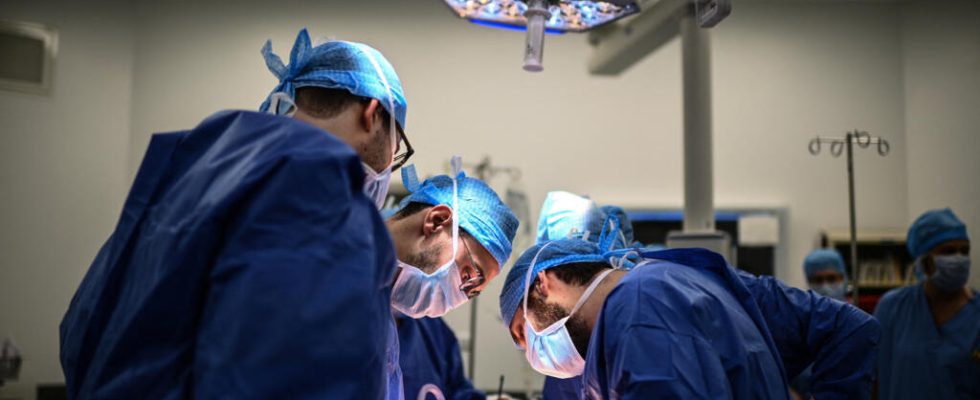The crisis in the hospital sector in France also has an impact on kidney transplants with living donors, where the wait can last several years. This type of operation, which must be planned and carried out in a university hospital center, is sometimes delayed.
They are sitting very close to each other in the consultation room of the CHU (university hospital center) of Poitiers. Jacky, 75, has a catheter on his arm to facilitate the blood samples to be taken that morning; he will donate a kidney in a few months to his wife, Nadia, 73, who suffers from chronic kidney failure in the end stage. “ It happened straight away, as soon as we knew we could! “, he explains, modestly. “ After 54 years of marriage, he still gives me a beautiful gift! », jokes Nadia. “ It is a beautiful gift of love. There are two of us in this fight against illness “, she adds, gratefully.
The harvest and transplant should take place in June, not before. Their journey was hampered by the difficulties of the healthcare system. “ Our only regret in this adventure is the waiting time to carry out the examinations because of the medical desert: over six months! It is enormous. The last one, a kidney scan: two and a half months to have this appointment, in town though… “, she explains. And these exams are fundamental.
“ Our priority is not to harm the donor », tells us Nathalie Charge, the nurse coordinator of kidney transplants. “ If we take a kidney from a living donor, it is because he is in perfect health and we are sure that, by removing a kidney from him, we will not put him in danger for his future life. This is the whole purpose of the examinations, which can take place over several months, due to the lack of human resources, whether in the hospital or in town. »
Access to the block complicated
Another difficulty sometimes: finding an operating room slot to schedule collection and grafting on the same day. According to Professor Antoine Thierry, nephrologist and head of the kidney transplant program at Poitiers University Hospital, “ The hospital crisis is manifested by difficulties concerning hospital staff, particularly in the areas of anesthesia and operating room nurses. The lack of these personnel complicates access to the operating room and delays the deadlines for scheduling our transplants with living donors. »
However, delaying the transplant can present a risk for the patient, even when they are on dialysis, a heavy treatment intended to supplement kidney function. “ The main consequence is the risk that, if the time to schedule with a living donor lengthens, the recipient’s state of health will worsen, even if he or she is on dialysis. However, you can be exposed to a certain number of complications during dialysis and therefore, a fortioria loss of chances: you can have a cardiovascular accident, infectious problems which will complicate, delay, make this transplantation more risky”, recalls Professor Thierry.
The problems of the health system also sometimes weigh on the monitoring of transplant patients. Nearly twenty years ago, and after several trying years on dialysis, Éric, now 57 years old, received a kidney from a deceased donor. Then, when the graft stopped working, in 2017, his brother gave him a kidney. “ Every year, we have to take stock of ourselves,” he explains. “ We have a dermatological, dental, cardiological assessment, we have a Doppler ultrasound of the graft, that is to say an ultrasound to see if the graft is well irrigated, to see if it is in good shape, etc. We also have an x-ray of the lungs. ” According to him, ” for all these exams, it’s more and more difficult to get an appointment! »
Alain, four years older, explains his approach to us: “ Eric, I had already proposed to him the first time, because seeing your brother on dialysis and not in good shape is hard. And there, I didn’t want him to go back to dialysis. It’s also an opportunity, in some ways, to be able to give because we have good health and we meet the criteria… As we can only live with one kidney, it’s not a problem. » « I admit it’s a wonderful gift… Plus, since it was close to Christmas, he’s become my Santa now! It was December 14, 2017! This is one of the dates we remember, it’s a new birth! », Adds, moved, his younger brother.
Transplantation is the best treatment for end-stage renal failure for the patient. And the cheapest for the community.
